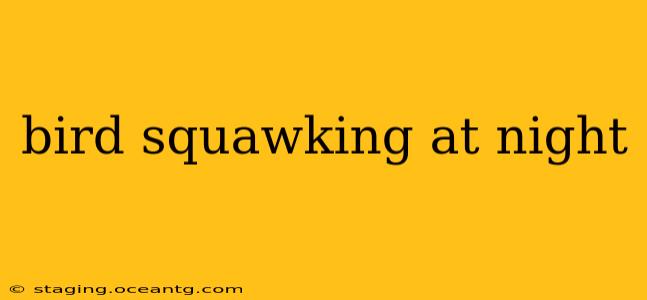The eerie squawk of a bird in the dead of night can be unsettling. While many birds are active during the day, several species are perfectly comfortable vocalizing at night, and understanding why can help alleviate any concerns and even provide a fascinating glimpse into avian behavior. This comprehensive guide delves into the reasons behind nocturnal bird calls, addressing common questions and offering solutions to minimize disruptions.
What Birds Squawk at Night?
Several bird species are known for their nighttime vocalizations. Common culprits include owls (obviously!), but also some species of crows, kookaburras, and even certain songbirds depending on their environment and circumstances. The specific species involved will vary depending on your geographical location. Identifying the bird is the first step in understanding its nocturnal behavior. Consider using a bird identification app with sound recognition features to help pinpoint the culprit.
Why Do Birds Squawk at Night? Different Reasons for Different Birds
The reasons behind nocturnal bird calls are diverse and often intertwined. Here are some of the most common explanations:
Territorial Defense
Many birds, especially those with nocturnal habits like owls, use vocalizations to defend their territory from rivals. A loud squawk serves as a warning to intruding birds, staking their claim to resources and mating areas. This is particularly prevalent during breeding season.
Mate Attraction
Similar to territorial defense, calls can also be a crucial part of attracting a mate. Nocturnal calls can increase the likelihood of attracting a partner, especially in species where finding a mate requires extensive searching in low-light conditions.
Alarm Calls
Birds might squawk at night to alert others in their flock to potential dangers, like predators. This is a crucial survival mechanism, ensuring the safety of the group.
Distress Calls
Sometimes, a bird might squawk due to distress. This could be caused by injury, being trapped, or experiencing some other form of hardship. If you hear persistent distress calls, consider checking the area for a bird in need of assistance.
What Can I Do If a Bird is Squawking at Night and Keeping Me Awake?
The best course of action depends on the reason behind the squawking. If the calls are due to territorial disputes or mating behaviors, little can be done besides patiently waiting for the birds to settle down. However, if you suspect the bird is in distress, consider carefully approaching the area to assess the situation. Avoid direct contact and if the bird appears injured, contact your local wildlife rescue or animal control.
Is It Normal for Birds to Squawk at Night?
Yes, it is perfectly normal for some bird species to vocalize at night, although it might be uncommon for the species in your immediate area. Nocturnal calls are an integral part of their communication and survival strategies.
How Can I Identify the Bird Making the Noise?
Utilize online resources such as bird identification apps and websites. Many apps offer sound recognition features that can help you pinpoint the species responsible for the nocturnal calls. Pay close attention to the call's characteristics: tone, frequency, and rhythm. This can significantly aid identification.
Are There Any Dangers Associated with Nocturnal Bird Calls?
Generally, nocturnal bird calls pose no direct danger to humans. However, persistent loud calls can disrupt sleep. Understanding the reason behind the calls can help you manage the situation effectively. In the unlikely event of a bird in distress, exercising caution when approaching is always advisable.
In conclusion, the next time you hear a bird squawking at night, remember that it's likely a natural behavior with a specific purpose. By understanding the potential reasons behind the calls, you can better appreciate the fascinating world of nocturnal avian communication. Remember to always approach any situation involving wildlife with caution and respect.
